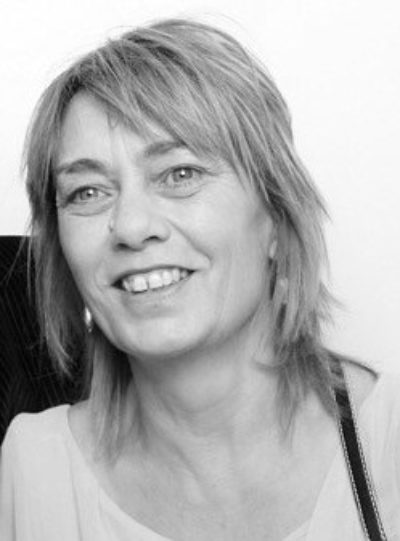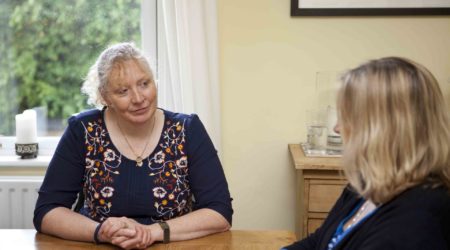



Rob & June
Rob remembers his wife June, who was diagnosed with pancreatic cancer in 2014, and talks about coping with the loss of a loved one
In the Autumn of 2014, June, my loving partner, best mate and general bringer of happiness for 10 years, was diagnosed with terminal pancreatic cancer.
June passed away on 17 October 2015, aged just 55. Three years on I have written this as a tribute to her. It is difficult to know the best way of marking such a sad day. One of the things that June repeatedly said during that difficult year was to focus on the positives, for people to remember the good times rather than dwell on the sadness and unfairness of such a cruel illness. Positivity and practicality are just two of the incredible qualities that June’s friends and family remember about her.
So rather than write about June’s illness and treatment I thought I would write a little about the positive things that we managed to achieve in that year, and maybe just a few of some of things I learnt along the way as a partner and carer during that time and have since reflected on in the hope that it may help someone in a similar position.
I still find it hard to put myself into June’s head at that time, to find out that you have only a short time left to live with no accurate prediction of how long and what quality of life you will have during that time. I am still in awe of her almost pragmatic response and, if I am honest, do not fully understand how she coped.
June had a very close network of loving friends and colleagues and they rallied round to help with the practical and emotional support that we both needed. As a partner I felt torn between providing this for June but also holding down a new job (which I had just started) and providing for our family so we all still had a comfortable home and the means to afford some of the things we wanted to do during that time. We still had a mortgage and bills to pay, and with an uncertain future we both felt the need to carry on as normally as we could. June continued to work long into her illness, and her employers were incredibly understanding and accommodating, as were mine.
Thanks to the incredible care of the staff at the hospice and help from family and friends we managed to ensure that June passed away peacefully at home as she wished. June’s funeral was truly a celebration of her life with music, pictures, smiles and laughter. Exactly as she wanted it to be.
Doing the practical stuff
During such a difficult time it is almost impossible to put yourself in the same headspace as your loved one. As a partner you are probably least equipped to do so because of your own emotional turmoil. There were many times when I could not understand the importance or even the urgency to make some decisions. I wanted to block out some of the inevitable decisions that had to be made and couldn’t fully comprehend the urgency in doing so. I didn’t want June to have to face these decisions.
Now of course I realise that I was avoiding those discussions and admire June’s bravery in dealing with such things in a practical way, and of course appreciate that she wanted to deal with them. With the benefit of hindsight, I now wish we could have covered more practical arrangements. Whilst we worked through the obvious things, such as making wills and sorting June’s ill health retirement (which for June was more about being able to access finance to tie up loose ends rather than leaving work), we didn’t fully explore all of the financial consequences and as a result may have been over cautious.
One of my biggest concerns looking back is that I did not give up work completely to spend more time with June. It would not have been as financially crippling as we thought it would be. Some people have said that it would have been the wrong thing to do, that June would not have wanted me to be with her all the time and it would have limited her quality time to spend with others. They are probably right, but to me now there were some opportunities missed to spend time together and juggling work at that time added stress I didn’t need. Maybe a compromise would have been to agree more flexible work arrangements with my employers. It’s worth asking rather than wishing you had.
Make every minute count
My son has a watch left to him by June which has been engraved with the words “Make every minute count”. It is a sentiment that we now try to live our lives by and something that we tried to achieve during those final few months.
With the help of friends, June created a bucket list of things she wanted to do, some of which were never going to be achievable given her declining health, the schedule of chemotherapy and the unplanned stays in hospital for procedures to fit stents or treat other symptoms. She would have good days and bad. The period during chemo was the worst. Plans had to be flexible and we eventually had to be realistic about what we could do, but we did make the very best of the times when she was well enough to enjoy doing stuff.
I am happy that we managed several of the things on that list that were most important to her. We got married, had a trip to New York with close friends, held a big party to celebrate our marriage, plus had a couple of holidays, the last of which was less than a month before June passed away. Equally important for June, she spent some quality time with her friends and family and reacquainted herself with people that she had spent less time with over the previous years.
During our break in New York we scheduled all of our activities around the daily ups and downs, allowing time for June to rest and recharge. I am staggered when I think back on what she was able to enjoy. We were blessed with one week shortly after June decided to stop having chemo when we took a break to Croatia. Right up to the day of the flight she was feeling terrible and we were on the verge of cancelling it, but we took a risk and went ahead and were so glad we did. It was the longest period in the final 3 months when she felt well. For the first time in months she was able to enjoy food, take walks, sunbathe, have spa treatments and relax in the pool. All the normal things you like to do on holiday. Had we let our worries about what might happen if she took a turn for the worse get the better of us we would not have had that precious time together.
Letting go and saying goodbye
There are several things I have learnt about the grieving process in the last three years and I will attempt to record some of them here in an honest way. Grief seems to affect people in a staggering variety of ways and I have witnessed this in friends and relatives, and of course my own experience.
The first thing to say is that whilst caring for someone you love that is terminally ill you will spend a stupid amount of time worrying about the final few hours, minutes and moments, and what ‘the end’ will be like. I’m not sure anything I write will prevent anyone else doing this but all I can say is that it is calm and peaceful and you will know when the time comes what is happening. Yes it is hugely upsetting but you are somehow able to say what you want to say, the words that you reluctantly and secretly rehearse in your head in the time running up to end. June passed away peacefully with some of her family and with me and Bob, her faithful trailhound, at her side. I know she passed away when she was ready, knowing how much she was loved.
Another thing that is difficult to write about is the conflict between wanting it all to be over, the person you love to be free from any suffering and of course not wanting to let go. In the end you have no control over that. People tell you not to feel guilty about it but you will. I don’t have any words of wisdom except to say in my experience the guilt subsides in time and you won’t be the only one to experience it.
During that final year June and I had many conversations that I wasn’t comfortable with at the time. Some of these were about moving on and being happy. June wanted me to find another partner quickly, to the point that she even threatened to create a profile for me on a dating site so she could vet potential candidates! I hated those conversations, but looking back now I am glad they took place. As it happens I did meet someone quickly, and there are some that say too quickly. They are wrong by the way! I know of people that need to grieve alone and feel it disloyal to move on. In their circumstances they may be right, but for me and June it wasn’t the right thing to do.
Everyone that really knew June and knows me also knows and appreciates how good it has been for me to meet someone else very special who has allowed me to grieve in my own way, and has been there to help with those difficult memories. The moments that just hit you hard like hearing a special song or a being in a favourite place, and those tough days like birthdays and anniversaries. Someone who is sensitive to the past and has never sought to replace June, but provides love, support, hope, a happy future and new adventures. It takes a very special person to be able to do that. I still grieve for June and have happy memories of a loving, close relationship. I don’t think that being in a new relationship lessens the pain or speeds up the grieving process, but having someone to love in a new way has helped me cope better and rebuild my life quicker.
Remembering June
During those last few months June gave away many items that she wanted people to have as a memory of her, but of course in the end there also comes a time when you have to clear out wardrobes of clothes, cupboards of items and boxes of shoes…the shoes! Despite her love of shopping I never fully appreciated how many pairs of shoes and boots she had!
I was told many times that it is cathartic to clear out those items, and it is, but it is not easy. I remember one particularly difficult time when going through a handbag which contained lots of everyday things. A lipstick, handwritten notes, an identity pass for work, receipts, gloves, lots of ordinary objects that open a window into a normal everyday routine as though she was still here living her life. Holding a pen that you know was last used by that person somehow re-connects you to them for a moment. To contradict myself don’t feel that you have to get rid of everything. If it feels special, is unique to that person, or brings back memories of them, keep it.
What also comforted me was the fact that so many people valued items of no great material value. I too have kept many special items and again it is surprising the previously insignificant items that can have a great impact.
I still take a few moments every day to think about June. For me it’s the morning walk with the dogs when I am alone and my head is clear of all the other every day stuff when I purposely do it. It gradually becomes less upsetting and more uplifting. You find yourself smiling more about memories and crying less about them.
17th October 2018




